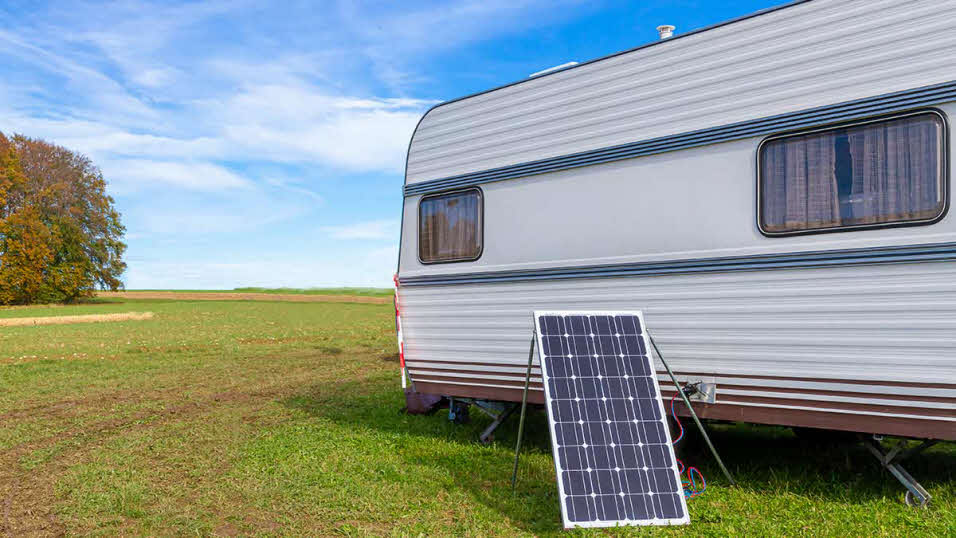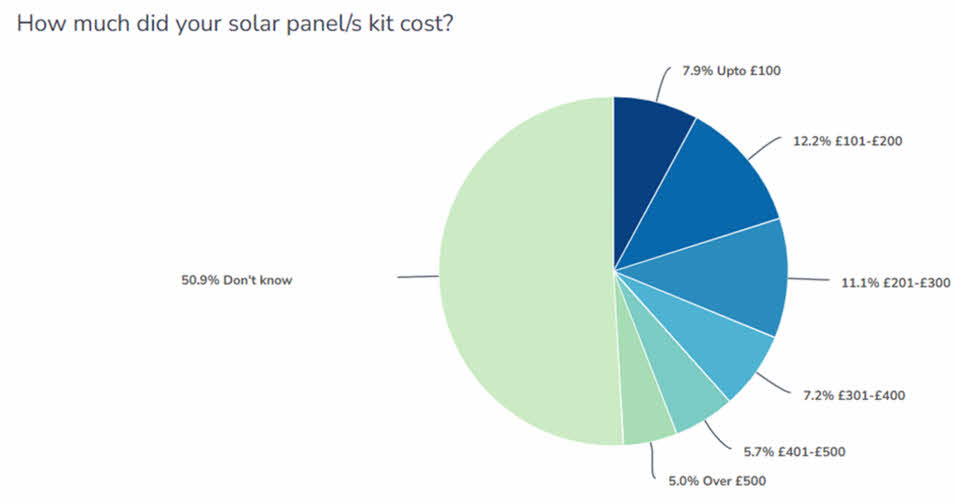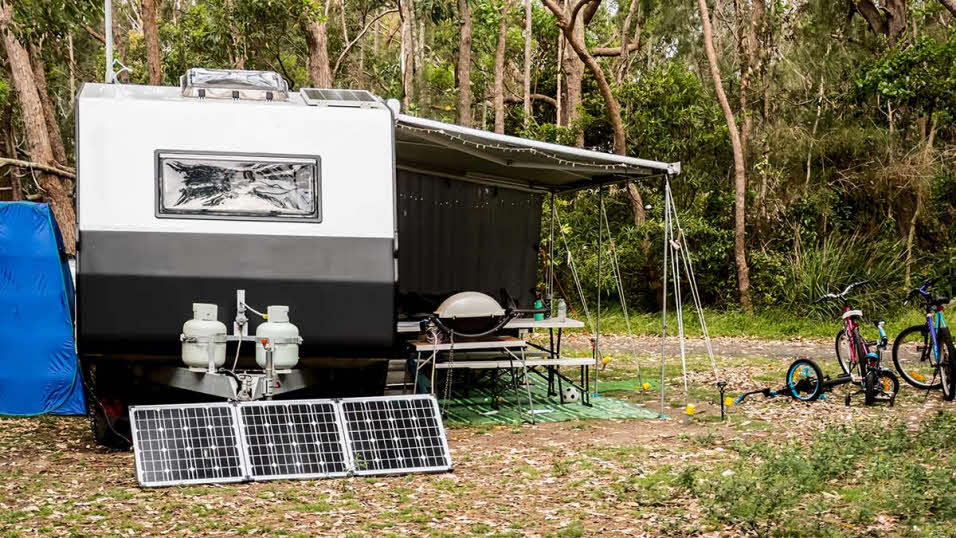Smart metering
The Club offers Smart metering in a bid to drive down electricity consumption at Wyatts Covert Club Campsite, plus we're trialling non-electric options elsewhere.
Read moreThank you to everyone who sent us their thoughts on solar panels for their caravan, from the poll in the last newsletter. We have collated all the responses as well as the advice that members offered to share with you.
The feedback showed that 86% of the responders already had solar panels. The vast majority of you (84%), have just one panel, but 11% have two, and nearly 3% have three panels.
The most popular type of solar panel that our members own are the fixed rigid ones with only 18% having the stand alone, portable versions.

The majority of you prefer to have the solar panels fitted by the manufacturer or they already came with the caravan when you bought it, rather than installing the panels yourself.
For those of you that don't have solar panels, we asked "Is this something you are thinking about?". This resulted in a 50:50 split, with half of you saying that you were definitely thinking about planning on getting panels installed. The 50% who said they were unlikely to get solar panels were against the idea, with comments such as:
"Do I really need to invest in a system that I may only benefit from once a year?"
Some of you said that you aren't planning on getting solar panels because of concerns over some technical aspects:
"What is the degradation period? E.g 50% over 10 years?"
"Do I really need them? I would only occasionally use them if I had them. Extra weight to carry. Good for festivals and rallies."
"How will I know how much power I will be generating? For example when in storage over the winter, to operate the alarm etc."
Other comments and concerns were:
"My caravan roof isn’t strong enough."
"We’ve got solar panels on our bungalow, but wouldn’t have them on our caravan as we’d have trouble keeping the roof clean."
"They're not cost effective enough to provide the amount needed. We don't get nearly enough sun in the UK."
"Insufficient to power off-grid and I use a full cover in the winter. Would need a minimum of 2 kWh."
"We never go off-grid and they are very expensive."
"The cost."
"Too much hassle."
"No need to be off-grid."
"Don’t want to compromise the van roof."
"Currently cannot see the point of additional expense when not looking to go off-grid at any time in the near future."
"I’ve tried it in the past, unsuccessfully."
Those of you who have purchased solar panels for your caravan, however, have spent varied sums on this renewable energy option.

The reasons that many of you have solar panels on your caravan, apart from the ones that were already fitted on when the outfit was bought, were:
Some members have had solar power panels recommended to them by other tourers.
Of the respondents who owned solar panels, we asked them to highlight any concerns that they had with their solar panels. The majority at 75% were extremely or very satisfied with the performance, commenting:
"They are brilliant, best piece of kit I have ever bought."
"The panel works well to maintain the leisure battery in the caravan and allows time to be off grid."
We also asked whether your solar panels were covered by your insurance or financial cover.
Although almost 49% of respondents said yes, which is great news, 46% of you were not sure and 4.5% said no. If your solar panel(s) is not covered by your current policy, you might want to take a look at the Club's Caravan Cover. Under our cover, solar panels are included as part of your caravan equipment. All you have to do is make sure you have sufficient cover for all your equipment. If you are unsure, please do call us on 01342 649 880.
For anyone who is unsure about whether their panels are covered, do make sure you check with whoever covers your caravan, because you don't want to be out of pocket if your solar panels are stolen.
We believe our members have some wonderful advice to share and so we asked their opinion on this subject and to share any experiences they have had. Some are shared below, however please be aware that we have not checked the accuracy of this advice and therefore we suggest that you do your own research to work out what is right for you.

We have split our member's knowledge into three sections: technical, experience and advice:
Technical:
"The longer the cable, the more voltage loss."
"Make sure the charger/controller is configured correctly."
"It is worth getting a fixed solar panel with proper fittings. Less clutter to carry around and no chance of it being stolen when in use and you’re away from the caravan."
"Good quality charging regulator, the bigger the panels, the better. If it's a temporary fit, then make the wiring simple so you can plug it in easily."
"Solar panels will only provide a complete off grid performance if you have 400W capacity minimum, and ideally a second battery and a Sine Wave converter to convert 12v to 240v for your main sockets. It's an expensive option to go the whole hog. I have a 100w panel on the roof to ensure enough power for motor mover which I have to use every time I collect the van from storage, but this will happily run all 12v requirements for up to a week without mains charging as long as the weather is fair."
"If you are not an electrical engineer, seek advice before building an off grid 240v system. At 12v, the current is around 250A for a 3kW system so to prevent fire, cables need to be rated at a suitable diameter. For example 95mm for 250A."
"We have 60W and it fully charges the battery by lunchtime the next day. Too many people buy panels that are too big and expensive."
"Even with a 100W panel, there is enough charge to keep the battery topped up when there is no hook-up."
Experience:
"We'd already bought 2 rigid portables and then decided to get some more as our long stay site was off grid. As we were going to be there for some weeks we decided to buy 2 more flexible types. So in all, we have four panels and 3 battery including unit one on a 5-berth caravan. Lucky to have a wonderful hubby who was a lecky and gas engineer by trade! It is literally home from home and when it’s hammering down outside we have our favourite shows to watch on TV."
"Great for keeping your battery topped up throughout the year. Stay off-grid longer. Great for sites that have metered EHU because of little use of mains."
"Worth it when your van is in outside storage as you don’t need to worry about the battery. Cost of panels need to be balanced against any savings. Ours were already on the new van but we probably would not otherwise have them retro-fitted."
"I fitted this cheap and cheerful panel after we had problems with the mover. The battery seemed not to have enough power when the van had been left for a few weeks. Now I have no problem at all."
"Our small stand alone, bought from a caravan show years ago, plugs into the electrics and maintains full battery all of the time in storage and allows us up to 5 days grid-free caravanning. Excellent value for money."
"Keep them clean, especially after any prolonged storage period."
Advice:
"Get one."
"Fit a panel to maintain the battery at all times, reassurance that the battery is in good condition and not taking electricity from the national grid."
"Whilst spending the money, fits as many as you can afford."
"Have used off-grid for long weekends with no problems."
"A great investment."
"Worth investigating."
"Excellent for winter storage battery top up so there is no need to remove battery for charging. This also allows uninterrupted use of tracking devices. Also good for short periods off-grid."
"Worth having. Get the best rating you can, ensure they don't take too much of your weight allowance and keep them clean and insured."
"Shop around for the best prices and get advice from other caravanners with solar panels fitted."
"Buy the best you can afford."
"Keep it clean."
"Definite benefit."
One member addressed a couple of the concerns reported earlier: "Is there enough sun to generate solar power in the UK?" and "Can you win, re: cost versus benefit?”
The answer to both was an affirmative YES. Yes you can win cost versus benefit and yes there is enough sun, perhaps with the exception of the December and January months.
Lastly, one final comment from one of your fellow caravan owning members:
"I did the installation myself after watching MANY YouTube videos about it. And learning a lot about all the electrical factors. I used Renogy controller and Renogy Inverter. I have 5 panels, each can deliver 120w in perfect conditions. 4 of the panels keep the lithium 100Ah battery at max so there is plenty of 12v for every evening. The 5th panel keeps a "PowerOak" 500Wh pack charged fully and this then charges all my devices and rechargeable torch, shaver, vacuum cleaner etc. I'm not a mechanic or anything but after lots of research I figured I could do it myself and save a lot of money which I spent part of the savings on the tools I needed. During the day, from about 7am in the summer, the solar panels run the fridge via the inverter, and at about 6pm, I switch the fridge back to gas. I tour full time and I save a lot by only ever needing pitched with no EHU (approximately £5 a day saving). The extra gas I use is less than the savings on electricity, so all in all I am "winning". I am off-grid for 10 months in the UK. Only in December and January have I had to hook up to EHU."
Find out more about what the Club is doing to support members in going "off-grid", reducing costs for the Club and reducing our impact on the planet on our Smart metering page.